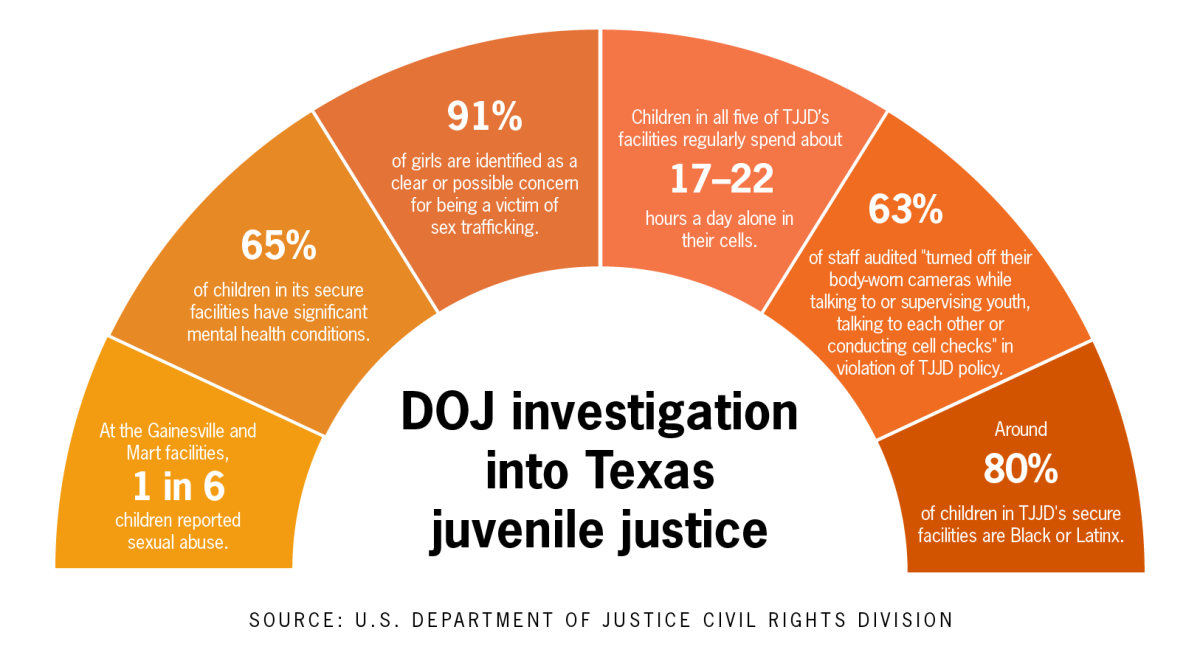An Aug. 1 report from the U.S. Department of Justice revealed harrowing details about the condition of Texas’ juvenile detention facilities after a three-year investigation into complaints of alleged abuse in the Texas Juvenile Justice Department.
The report details the failure to protect children’s rights on a variety of issues including sexual abuse, mental health care access, disability rights, physical abuse and isolation in solitary confinement up to 22 hours a day. The report suggested the Texas Juvenile Justice Department implement a list of measures to address the issues in the facilities regarding the use of force, behavior management, sexual abuse, mental healthcare and special education.
Alycia Castillo, associate director of policy for the Texas Civil Rights Project spoke at the Texas Juvenile Justice Department Board meeting on Aug. 9. She said the conditions in these prisons are damaging to the children who live in them.
“We already have kids who are at their breaking point who are mentally unstable and unwell and disabled, and then we lock them in cages,” Castillo said. “It’s going to damage them further, traumatize them further and exacerbate the behaviors that we’re trying to guide away from.”
A key point of the report states the educational resources for children in the system are inadequate. Michele Deitch, a lecturer at the LBJ School of Public Affairs and the director of the Prison and Jail Innovation Lab, said the lack of education will impact the children after they leave these facilities.
“They’re much more likely to drop out of school,” Deitch said. “If they drop out, they’re more likely to continue involvement in criminal activity, and they’re more likely to cycle in and out of the system in the future as they grow into adults.”
In a statement, the Texas Juvenile Justice Department said that they “have a zero-tolerance policy toward abuse and neglect and have always fully rejected any abusive behaviors at our campuses.”
Jennifer Toon, an advocate with Lioness Justice Impacted Women’s Alliance, who was incarcerated in Texas Juvenile facilities during the ‘90s, said she believed an investigation from the Department of Justice would give some validity to the claims of people like herself with lived experiences inside of state juvenile correctional facilities.
“I feel personally betrayed,” Toon said. “I have done my part. I have gone with other advocates to build these bridges, make connections with a lot of the folks that work at (the Texas Juvenile Justice Department), and then to be told as soon as we sit down from our comments that (they) don’t believe some of the things are accurate. It feels like here I am, once again, giving an ounce of trust like I did as a kid. … And once again (I am) totally dismissed, harmed and minimized.”
She also said the issues with these facilities are not financial or staffing problems, they are a fault with the entire system.
“Carceral settings are inherently harmful to human beings, period, but especially children,” Toon said. “I don’t know how to make that any more clear to them. … Can you imagine a child trying to process trauma-informed care in the environment that’s reflected in that report? It’s not gonna happen.”














